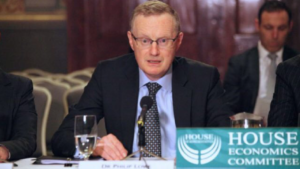Home » Commentary » Opinion » RBA’s lack of interest
· IDEAS@THECENTRE
 At last Friday’s Parliamentary hearing, the RBA’s performance was disappointing. It appeared reluctant to consider alternatives to its pre-conceived choices, unenthusiastic about pursuing its mandate and uninterested in leading ideas in central banking.
At last Friday’s Parliamentary hearing, the RBA’s performance was disappointing. It appeared reluctant to consider alternatives to its pre-conceived choices, unenthusiastic about pursuing its mandate and uninterested in leading ideas in central banking.
The highlight was a lively confrontation between Governor Philip Lowe and Andrew Leigh, the ALP Member for Fenner and a former economics professor.
Leigh asked about the RBA’s decision to buy government bonds, so-called ‘quantitative easing’… and why they shouldn’t do even more. After being pressed, the RBA conceded that doing more would probably lower unemployment and raise inflation, though the size of the effect was unclear. As Leigh remarked, “It’s not obvious that this is a bad thing”.
After a bit more floundering, RBA Deputy Governor Guy Debelle suggested that extra bond buying might “end up with a dysfunctional bond market”. Bond market participants rejected this, noting that the bond market was thinner in the 2000s without substantial problems.
The RBA gave the impression it had not really thought about the consequences of its decisions and was just making up excuses for inaction.
Leigh asked whether the RBA might tolerate a period of above-target inflation, to make up for the current prolonged period of below-target inflation. Lowe’s reply — “I haven’t thought too much about that” — was both surprising and puzzling. ‘Average inflation targeting’ was the centrepiece of the US Federal Reserve’s recent overhaul of its monetary policy framework and is a leading idea in monetary policy debates.
Leigh then suggested that the RBA was unusually insular. Lowe disagreed, saying that three of the top 20 or so RBA executives had actually been appointed from outside — a strikingly unpersuasive argument.
Leigh asked whether disagreements within the RBA staff were ever presented to the RBA Board for adjudication. Lowe replied yes, to which Leigh responded that he could not see this in the Board minutes. My reading is the same as Leigh’s – the minutes do not convey disagreement.
There was considerably more in this vein, and interested readers should read pages 8 to 11 of the transcript.
These flubs might seem like “gotcha” games but they point to fundamental problems in the RBA culture. And that culture is likely to lead to poor decisions.
RBA’s lack of interest